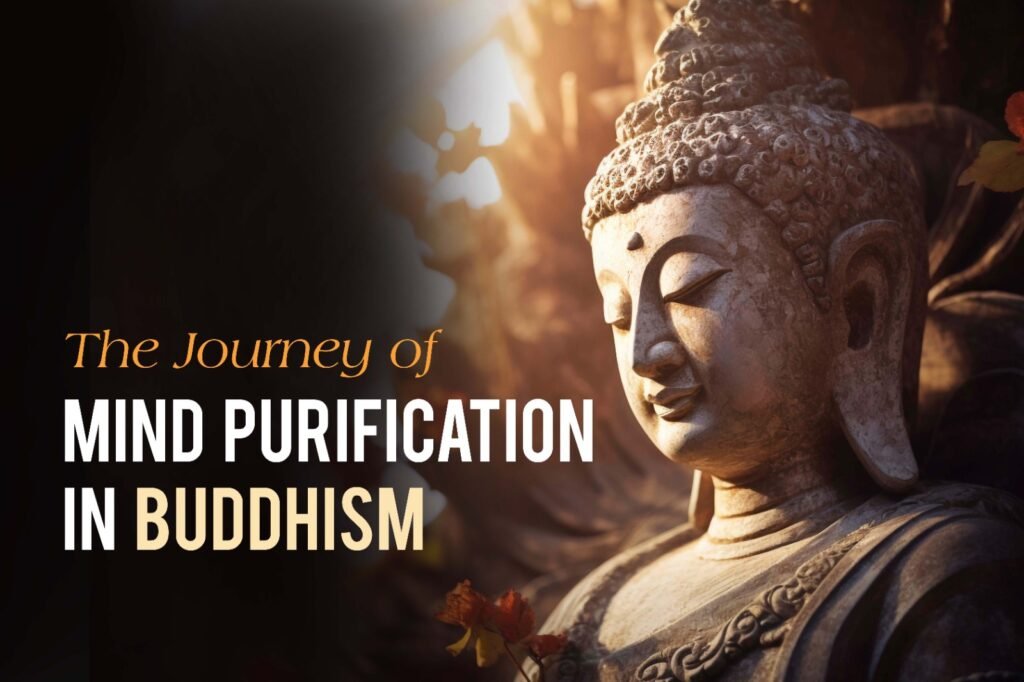Table of Contents
ToggleIn the busy bustling world, our minds are always filled with hundreds of thoughts and stimuli. Different thoughts, emotions, desires constantly come and go from time to time.This can create different emotional fluctuations and everyone is trying to find a way to calm down the mind which is having hundreds of thoughts. Buddhism can help in this and it offers a path to solve this chaos- the concept of purification of mind. This is a journey and it will help you attain a calmer mind by fostering compassion, wisdom and ultimately liberation from suffering.
Let’s understand purification of mind in Buddhism
Purification of mind, as used in Buddhist teachings, is the process of ridding the mind of undesirable thought states known as “Kleshas” or “defilements.” According to Buddhist philosophy, these defilements—greed (lobha), hatred (dosa), and delusion (moha)—are what lead to suffering (dukkha). It can open the door to knowledge awakening, inner calm, and clarity by clearing the mind of these undesirable traits.
Buddhist Teachings on Mind
The foundation for comprehending mind cleansing is laid by the Four Noble Truths, which are the central teachings of the Buddha. These truths recognize that suffering exists in life, pinpoint attachment as the root cause of suffering, and provide the Eightfold Path as a means of achieving emancipation. Serving as a road map, the Eightfold Path leads us to wisdom (panna), conscious awareness (samadhi), and moral behavior (sila). While all facets of the Eightfold Path aid in mind purification, moral behavior and meditation are especially important.
Main Concepts of Mind Purification
The Three Poisons:
The three poisons are greed, hatred, and illusion. These are thought to be the main impediments to mental cleansing. It’s crucial to comprehend their nature and learn how to overcome them. Lobha’s definition of greed is the unquenchable need for goods, experiences, or even people. It’s a need for more that is frequently coupled with a sense of unhappiness with what we now have.
- Greed: Greed can take many different forms, such as a desire for material goods, status, or power. When wishes are not satisfied, it strengthens attachment and results in suffering. Techniques for Conquering Greed: Becoming content (santosha) is essential to defeating greed. Perspective-shifting gratitude exercises that emphasize being grateful for what we already have might be helpful. Generosity, in the form of giving time, resources, or simply kindness, also weakens the hold of greed.
- Hatred (Dosa): Hatred is dislike or malice towards yourself or other people. It may show up as resentment, jealousy, or fury. Comprehending Hatred: Hatred is the result of feeling threatened or wanting to see someone or something suffer. It shatters our relationships and causes inner distress. Strategies for Overcoming Hatred: Metta, or loving-kindness cultivation, is the remedy for hatred. Compassion and understanding can be fostered and negativity can be replaced with empathy through meditation techniques that center on sending best wishes to ourselves and others. Another effective strategy is forgiveness, which enables us to let go of the past and move forward.
- Delusion (Moha): A skewed view of reality is called a delusion. It includes being ignorant, holding onto incorrect notions, and not realizing how fleeting life is. Recognizing Delusion: Confusion and misunderstanding result from delusions. It prevents us from seeing things as they really are and strengthens connection. Ways to Get Rid of Delusion: Overcoming delusion requires cultivating knowledge, or panna. Clearer comprehension of reality is fostered by Buddhist teachings on the Four Noble Truths and the Three Marks of Existence (impermanence, suffering, and non-self). Clarity and insight can also be gained through meditation techniques that center on objectively monitoring thoughts and feelings.
Practices for Mind Purification
Techniques for Meditation: The foundation of Buddhist mind-purification exercises is meditation. We can develop emotional stability and a deeper awareness of our mental processes by teaching the mind to focus and observe and being mindful
Vipassana meditation: This type of meditation develops awareness of the present moment. We can learn to notice our thoughts and emotions without letting them consume us by focusing on the breath or our physical experiences without passing judgment.
- Steps to Practice: Locate a comfortable spot to sit in peace. Pay attention to how your breath feels as it enters and exits your nostrils. Refocus your attention to the breath softly when your thoughts stray from it. Take small practice sessions at first, and as you get more comfortable, progressively extend them. Advantages of Mindfulness-Based Meditation Stress is decreased, attention is improved, and emotional control is encouraged by vipassana meditation. It helps us become detached from negativity and develop inner calm by enabling us to see the coming and going of mental states.
Kindness and Love Metta meditation: Metta meditation fosters self- and other-compassion and loving-kindness.
How to Put It Into Practice: Create loving-kindness toward oneself first. Repeat quietly.
Ethical Conduct (Sila)
Sila, the foundation of Buddhist practice, refers to living a life of moral virtue. This is embodied in the Five Precepts, guidelines that help us cultivate a wholesome mind and avoid actions that cause suffering.
The Five Precepts:
- Abstain from taking life. This includes treating all living things with respect and compassion in addition to causing them physical damage.
- Abstain from taking what is not given. In all of your financial transactions, strive to be honest and ethical. Don’t steal or take advantage of other people.
- Abstain from sexual misconduct. Be reliable and considerate in your relationships.
- Abstain from lying speech. Develop honesty and stay away from slander, rude language, and gossip.
- Abstain from intoxicants that cloud the mind. Retain calmness and avoid from substances that impair your ability to make decisions.
Role of Ethical Conduct in Mind Purification:
By abiding by the Five Rules, we create the foundation for mental peace. Remorse and guilt are the inner states that bad deeds cast a shadow over. However, moral action cultivates integrity and compassion, which enhance mental clarity and wellness.
Wisdom (Panna)
The term panna, which means wisdom, describes the development of a profound comprehension of the essence of reality. This understanding aids in our journey toward emancipation from misery.
Understanding True Nature of Reality:
- Impermanence (Anicca): Everything is subject to constant change, even our own ideas, emotions, and sense of self. Holding on to transient things leads to suffering.
- Suffering (Dukkha): Life is by its very nature full of pain and unhappiness. We are hurting because we are attached to transience..
- Non-Self (Anatta): Nothing is permanent. We are a collection of ever-changing processes.
Practical Tips for Daily Life:
These insights can be applied daily to cultivate wisdom:
- Recognize how fleeting your emotions and thoughts are. Watch them come up and go like clouds in the sky. When suffering occurs, acknowledge it, but try not to let it consume you.
- Recognize that while suffering is a normal aspect of life, it is not our eternal state.
- Release your attachments to your possessions and self-image. Genuine enjoyment originates internally, not from outside sources.
Integrating Practices into Daily Routine
Mindful Living:
- Mindfulness meditation: Develop the skill of being totally present, judgment-free, in the here and now. It can be helpful to use techniques like breathing awareness.
- Mindful actions: Make ordinary behaviors like eating, walking, and talking more conscious. Enjoy the moment!
Tips for Staying Present:
- Start small: Aim for a few minutes of mindful practice each day and gradually increase the duration.
- Engage your senses: Pay attention to the sights, sounds, smells, and textures around you.
- Be kind to yourself: Don’t get discouraged if your mind wanders. Gently guide your attention back to the present moment.
Cultivating Positive Mind States:
- Gratitude Exercises: List all the things, no matter how minor, for which you are thankful. Write in a thankfulness diary or express your thanks to others.
- Exercises for Compassion: Reflect on the pain of others and develop a sincere wish to lessen it. Imagine wishing people who are suffering well.
Conclusion: The Journey of Mind Purification
Purifucation of mind is a continuous process rather than a destination. By practicing consistently, you may create a pleasant and peaceful inner world, even if there will be challenges along the way.Take some time to reflect on who you are. Which negative beliefs or behaviors do you want to shed? Buddhism offers practical techniques for purifucation of mind. Small deeds can make a big difference. What better time to begin your journey than now? To find out more about Buddhism and Buddhist practices, check out our website Hidden Mantra.








